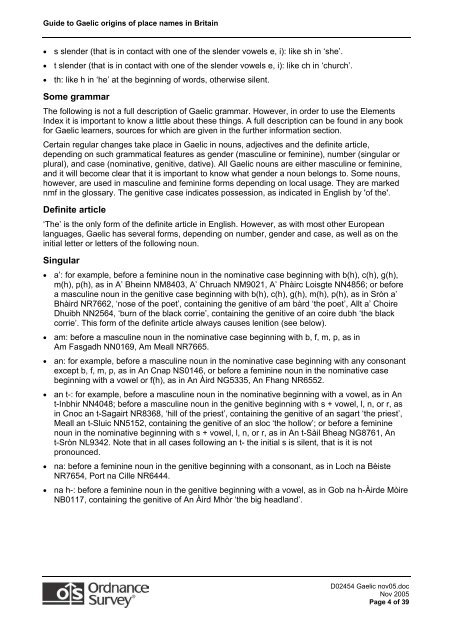guide-to-gaelic-origins-of-place-names
guide-to-gaelic-origins-of-place-names
guide-to-gaelic-origins-of-place-names
Create successful ePaper yourself
Turn your PDF publications into a flip-book with our unique Google optimized e-Paper software.
Guide <strong>to</strong> Gaelic <strong>origins</strong> <strong>of</strong> <strong>place</strong> <strong>names</strong> in Britain<br />
• s slender (that is in contact with one <strong>of</strong> the slender vowels e, i): like sh in ‘she’.<br />
• t slender (that is in contact with one <strong>of</strong> the slender vowels e, i): like ch in ‘church’.<br />
• th: like h in ‘he’ at the beginning <strong>of</strong> words, otherwise silent.<br />
Some grammar<br />
The following is not a full description <strong>of</strong> Gaelic grammar. However, in order <strong>to</strong> use the Elements<br />
Index it is important <strong>to</strong> know a little about these things. A full description can be found in any book<br />
for Gaelic learners, sources for which are given in the further information section.<br />
Certain regular changes take <strong>place</strong> in Gaelic in nouns, adjectives and the definite article,<br />
depending on such grammatical features as gender (masculine or feminine), number (singular or<br />
plural), and case (nominative, genitive, dative). All Gaelic nouns are either masculine or feminine,<br />
and it will become clear that it is important <strong>to</strong> know what gender a noun belongs <strong>to</strong>. Some nouns,<br />
however, are used in masculine and feminine forms depending on local usage. They are marked<br />
nmf in the glossary. The genitive case indicates possession, as indicated in English by '<strong>of</strong> the'.<br />
Definite article<br />
‘The’ is the only form <strong>of</strong> the definite article in English. However, as with most other European<br />
languages, Gaelic has several forms, depending on number, gender and case, as well as on the<br />
initial letter or letters <strong>of</strong> the following noun.<br />
Singular<br />
• a’: for example, before a feminine noun in the nominative case beginning with b(h), c(h), g(h),<br />
m(h), p(h), as in A’ Bheinn NM8403, A’ Chruach NM9021, A’ Phàirc Loisgte NN4856; or before<br />
a masculine noun in the genitive case beginning with b(h), c(h), g(h), m(h), p(h), as in Sròn a’<br />
Bhàird NR7662, ‘nose <strong>of</strong> the poet’, containing the genitive <strong>of</strong> am bàrd ‘the poet’, Allt a’ Choire<br />
Dhuibh NN2564, ‘burn <strong>of</strong> the black corrie’, containing the genitive <strong>of</strong> an coire dubh ‘the black<br />
corrie’. This form <strong>of</strong> the definite article always causes lenition (see below).<br />
• am: before a masculine noun in the nominative case beginning with b, f, m, p, as in<br />
Am Fasgadh NN0169, Am Meall NR7665.<br />
• an: for example, before a masculine noun in the nominative case beginning with any consonant<br />
except b, f, m, p, as in An Cnap NS0146, or before a feminine noun in the nominative case<br />
beginning with a vowel or f(h), as in An Àird NG5335, An Fhang NR6552.<br />
• an t-: for example, before a masculine noun in the nominative beginning with a vowel, as in An<br />
t-Inbhir NN4048; before a masculine noun in the genitive beginning with s + vowel, l, n, or r, as<br />
in Cnoc an t-Sagairt NR8368, ‘hill <strong>of</strong> the priest’, containing the genitive <strong>of</strong> an sagart ‘the priest’,<br />
Meall an t-Sluic NN5152, containing the genitive <strong>of</strong> an sloc ‘the hollow’; or before a feminine<br />
noun in the nominative beginning with s + vowel, l, n, or r, as in An t-Sàil Bheag NG8761, An<br />
t-Sròn NL9342. Note that in all cases following an t- the initial s is silent, that is it is not<br />
pronounced.<br />
• na: before a feminine noun in the genitive beginning with a consonant, as in Loch na Bèiste<br />
NR7654, Port na Cille NR6444.<br />
• na h-: before a feminine noun in the genitive beginning with a vowel, as in Gob na h-Àirde Mòire<br />
NB0117, containing the genitive <strong>of</strong> An Àird Mhòr ‘the big headland’.<br />
D02454 Gaelic nov05.doc<br />
Nov 2005<br />
Page 4 <strong>of</strong> 39


